BANK OF ALBANIA
PRESS RELEASE
Governor Sekjo: Address to the 8th meeting of the National Payment System Committee
Publication date: 09.11.2022
Dear Minister Ibrahimaj,
Dear ladies and gentlemen,
It is a great pleasure to open the 8th meeting of the National Payment System Committee (NPSC), fortunately in presence, while it shows that already some challenges have been overcome, while others have been generated. The latter have imposed direct and indirect pressures on our common multi-year work, which aims at bolstering financial inclusion and the use of electronic payments in the Albanian economy.
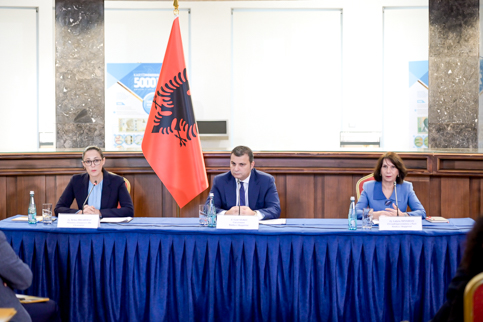
However, the Bank of Albania has strengthened the efforts for promoting the financial inclusion of the population, despite the problems triggered by the pandemic. The Bank of Albania, as the monetary, regulatory and supervisory authority, considers both financial inclusion and education, as two crucial strategic objectives for the monetary and financial stability, in turn for the formalisation and sustainable growth of the economy.
In this framework, the insofar implemented measures have reflected quite positive developments in the market, thus enabling the achievement of the targeted quantitative objectives in almost half of path of the National Retail Payment Strategy Action Plan.
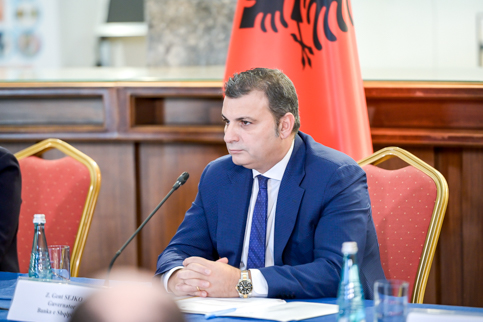
In more concrete terms, the use of electronic payments reached at 12.5 cashless payments per capita, exceeding the targeted objective in the Strategy of 10 payments per capita by the end of 2023. In 2022 this figure will hit at 16 cashless payments per capita.
Already, we can say that card payments and homebanking ones are increasingly becoming part of our population’s daily life, while developments related to financial inclusion are rather encouraging. The volume of card payments cards have considerably edged up, particularly in the last five years (2018-2022) marking an average growth trend of around 40% per year. In addition, POS terminals have increased considerably in the same period, by 78%. These indicators exhibit the heightened use of electronic payment instruments by consumers, which in turn positively affects the formalisation of the economy. Also, available data about the volume of homebanking transactions have marked an increase this 9-month period, of 22%, compared to the same period a year earlier, thus continuing to show the same upward trend in years.
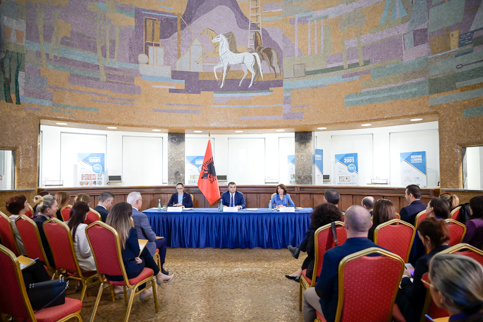
The data in the National Bank Account Register provide to the Bank of Albania a more accurate view which is easily updated on the financial inclusion of the population. These data indicate that Albanian citizens have a relatively pleasant level of financial inclusion, with almost 69% of the population owing an account. At the beginning, our objective was the financial inclusion of 70% of the pupation. We assess, this level will be exceeded in the short run, thus aiming to a significant approximation with the Balkans and the European Union countries.
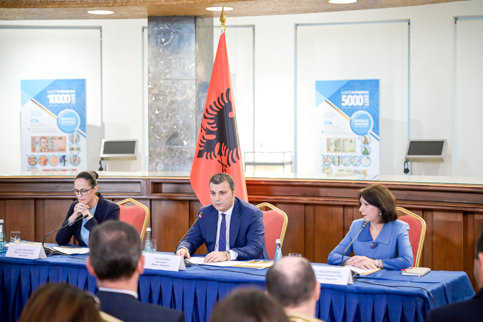
A set of factors and analyses provides ground for this optimism. In more concrete terms, though in our public communications we have mentioned the fulfilment of most of measures laid down in the strategy, these measures are still being materialised in the market, and their expected effects will be reflected in measurable indicators upon their completeness in 2023 and ongoing. In simple words, the insofar results in terms of financial inclusion and use of electronic payments are somehow the reaction to our conveyed messages, while the real and significant effects of the strategy will be completed in the short-run and medium-term period.
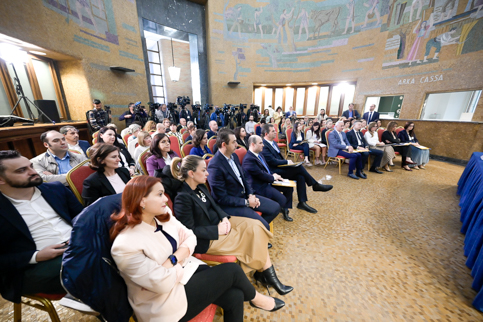
In this view, we deem that the Law “On payment services” indeed is the core pillar for the innovation and promotion of competitiveness, which we have noted in the increased interest of entities aiming to enter in this market segment. The open-banking operationalisation will drive to its full materialisation. In this regard, I see it necessary to emphasise that banks and non-banks should have a maximum commitment in order these infrastructures and relevant services be realised within the terms determined by the Bank of Albania, and at a maximum security. Safe communication and interaction is needed and indispensable given the open communication imposed by open-banking and in the framework of increased risks in the field of cybernetic security we are experiencing in nowadays. This has been the main reason for the Bank of Albania in carefully putting in place standards of well-defined regulation and broadly adopted by the European Union countries, simultaneously paying attention to provide the necessary time for all market stakeholders, thus enabling them for rather efficient and safe implementation.
In addition to the legal and regulatory developments, the Bank of Albania has undertaken a set of measures, like the operation of AIPS Euro for interbank euro-denominated payments within Albania, a rather effective development. Currently, the Albanian citizens are feeling the effects of this system in their daily life, by avoiding the long queues at banks’ windows for conducting payments in the euro from a bank to another, as a reaction to the applied commissions on the transfers taking place between correspondent banks.
The establishment of this system, along with the differentiation of commissions on processed electronic payments, appears to have been quite effective. In more details, from January up to the end of October 2022, around 120.000 payments are processed in the AIPS Euro and if making approximated calculations of the applied commissions before and after its operation, it comes out that around EUR 10 million are saved to the Albanian consumers and business. In this light, this project has bring a set of factors affecting - both in a direct and indirect way - the individual welfare of the customer, bank and the entire economy.
In addition, the Bank of Albania assesses that the interbank Direct Debiting regulation further accelerates the establishing of a more effective market, by providing a variety of payment services and instruments which accommodate the everyday needs of citizens.
In this regard, it should be highlighted that the Bank of Albania, the Ministry of Economy and Finance, National Agency of ICT and banking system, are closely collaborating since May, to create all possible alternatives for the conduction of online payments through electronic means.
We deem that the fulfilment of this objective significantly promotes financial inclusion and financial education, as well as the adaptation of the public with the electronic payments. In this view, we believe firmly, that digitalisation of government payments, - based in the experiences of other countries as well - is one of the most powerful leverage for achieving the objectives of the National Retail Payments Strategy, while coordination of efforts in this regard is the first step towards a broad gamma of measures which may be undertaken in the future.
The drafting and implementation of the draft law “On payment account with basic features” which transposes the relevant European Union directive, is another important measure undertaken in this regard. The purpose of this draft law is to establish the facilities in terms of costs for opening a bank account and its use for conducting payments to that segment of population which is not financially included or has a limited access. Alongside these measures, the draft law stipulates the offering of the basic features - account with no commission to certain categories of population, as retired people, students and persons benefiting economic aids.
The Bank of Albania to support the developments in the market is working on the improvement of payment system aimed at introducing new standards of both communication and services, which address the infrastructural needs for the implementation of the strategy. Furthermore, the Bank of Albania together with all market stakeholders will strengthen the efforts to realising the Instant Payment project.
Last, but not less, the work has started for drafting and implementing a National Financial Education Strategy, aiming at a more efficient materialisation of the analysed measures in this strategy. We assess that both financial inclusion and financial education are entirely interconnected, while supporting joint achievements and constituting strategic objectives of the Bank of Albania, as I mentioned it previously.
Concluding, I would like to particularly thank the Ministry of Economy and Finance, the banking system and all market actors for the continuous collaboration and coordination of efforts thus enabling the insofar realisation of this reform. Also, I would like to highlight that it is indispensable to continue with the same intensity and seriousness the accomplishment of the rest of measures set forth in the Strategy.
I wish you fruitful and constructive proceedings of this meeting!

 Twitter
Twitter
 Youtube
Youtube
 Facebook
Facebook
 Flickr
Flickr
 RSS
RSS
 Subscribe
Subscribe
 Feedback
Feedback